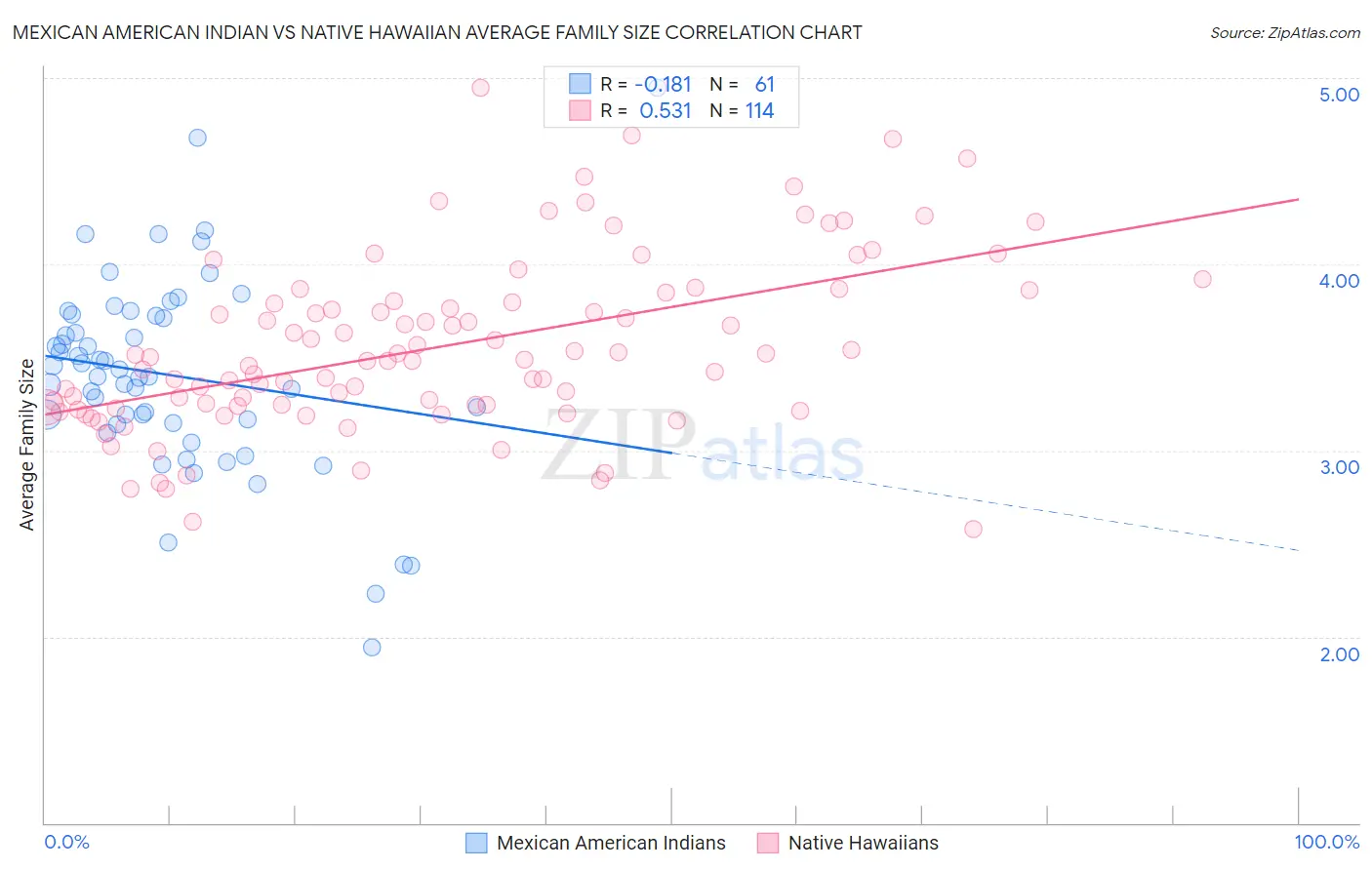Mexican American Indian vs Native Hawaiian Average Family Size
COMPARE
Mexican American Indian
Native Hawaiian
Average Family Size
Average Family Size Comparison
Mexican American Indians
Native Hawaiians
3.43
AVERAGE FAMILY SIZE
100.0/ 100
METRIC RATING
27th/ 347
METRIC RANK
3.43
AVERAGE FAMILY SIZE
100.0/ 100
METRIC RATING
26th/ 347
METRIC RANK
Mexican American Indian vs Native Hawaiian Average Family Size Correlation Chart
The statistical analysis conducted on geographies consisting of 317,496,069 people shows a poor negative correlation between the proportion of Mexican American Indians and average family size in the United States with a correlation coefficient (R) of -0.181 and weighted average of 3.43. Similarly, the statistical analysis conducted on geographies consisting of 331,878,111 people shows a substantial positive correlation between the proportion of Native Hawaiians and average family size in the United States with a correlation coefficient (R) of 0.531 and weighted average of 3.43, a difference of 0.010%.

Average Family Size Correlation Summary
| Measurement | Mexican American Indian | Native Hawaiian |
| Minimum | 1.94 | 2.58 |
| Maximum | 4.95 | 4.95 |
| Range | 3.01 | 2.37 |
| Mean | 3.40 | 3.56 |
| Median | 3.40 | 3.49 |
| Interquartile 25% (IQ1) | 3.15 | 3.24 |
| Interquartile 75% (IQ3) | 3.73 | 3.80 |
| Interquartile Range (IQR) | 0.58 | 0.56 |
| Standard Deviation (Sample) | 0.53 | 0.47 |
| Standard Deviation (Population) | 0.53 | 0.46 |
Demographics Similar to Mexican American Indians and Native Hawaiians by Average Family Size
In terms of average family size, the demographic groups most similar to Mexican American Indians are Immigrants from Latin America (3.42, a difference of 0.12%), Nepalese (3.42, a difference of 0.21%), Samoan (3.42, a difference of 0.24%), Central American (3.41, a difference of 0.44%), and Yakama (3.45, a difference of 0.52%). Similarly, the demographic groups most similar to Native Hawaiians are Immigrants from Latin America (3.42, a difference of 0.13%), Nepalese (3.42, a difference of 0.22%), Samoan (3.42, a difference of 0.25%), Central American (3.41, a difference of 0.45%), and Yakama (3.45, a difference of 0.51%).
| Demographics | Rating | Rank | Average Family Size |
| Ute | 100.0 /100 | #16 | Exceptional 3.49 |
| Immigrants | El Salvador | 100.0 /100 | #17 | Exceptional 3.49 |
| Salvadorans | 100.0 /100 | #18 | Exceptional 3.48 |
| Mexicans | 100.0 /100 | #19 | Exceptional 3.48 |
| Cheyenne | 100.0 /100 | #20 | Exceptional 3.47 |
| Yuman | 100.0 /100 | #21 | Exceptional 3.47 |
| Apache | 100.0 /100 | #22 | Exceptional 3.46 |
| Immigrants | Fiji | 100.0 /100 | #23 | Exceptional 3.45 |
| Natives/Alaskans | 100.0 /100 | #24 | Exceptional 3.45 |
| Yakama | 100.0 /100 | #25 | Exceptional 3.45 |
| Native Hawaiians | 100.0 /100 | #26 | Exceptional 3.43 |
| Mexican American Indians | 100.0 /100 | #27 | Exceptional 3.43 |
| Immigrants | Latin America | 100.0 /100 | #28 | Exceptional 3.42 |
| Nepalese | 100.0 /100 | #29 | Exceptional 3.42 |
| Samoans | 100.0 /100 | #30 | Exceptional 3.42 |
| Central Americans | 100.0 /100 | #31 | Exceptional 3.41 |
| Immigrants | Guatemala | 100.0 /100 | #32 | Exceptional 3.41 |
| Hawaiians | 100.0 /100 | #33 | Exceptional 3.41 |
| Hispanics or Latinos | 100.0 /100 | #34 | Exceptional 3.41 |
| Guatemalans | 100.0 /100 | #35 | Exceptional 3.40 |
| Immigrants | Guyana | 100.0 /100 | #36 | Exceptional 3.40 |